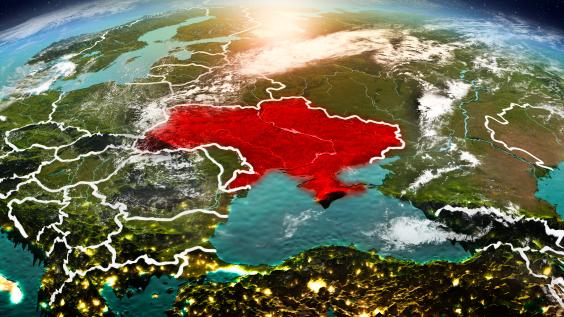The War in Ukraine Is Underscoring US Security Challenges in Europe and East Asia

Table of Contents
Author(s)
Share this Publication
- Print This Publication
- Cite This Publication Copy Citation
Joe Barnes, "The War in Ukraine is Underscoring US Security Challenges in Europe and East Asia" (Houston: Rice University’s Baker Institute for Public Policy, May 3, 2023).
The Russia-Ukraine war may have created new solidarity among the United States and its allies. But it has also revealed fractures in the global geopolitical arena.
In Ukraine, Moscow’s offensive around the eastern city of Bakhmut grinds on, resulting thus far in minimal gains and high casualties for Russia. Attention has turned to the long-awaited Ukrainian counteroffensive. When and where this offensive will strike is still unknown. So, of course, is its outcome. Will the offensive lead to a decisive breakthrough by the Ukrainian military? Or descend into an ugly stalemate? Whatever occurs during the next few months will shape the ultimate outcome of the war. Full victory is out of reach for Russia; its effort to seize Ukraine has been a costly embarrassment. But Moscow still occupies large swaths of Ukraine. Any talk of peace is premature, and the situation on the battlefield will shape the contours of any settlement.
A Not-so-willing World
While most countries, as witnessed by their votes in the United Nations General Assembly, are prepared to condemn Russia’s invasion of Ukraine, far fewer are prepared to move beyond mere rhetoric. The “usual suspects” remain at the heart of the support for Ukraine: the United States and its traditional allies in Europe, the Far East, and Oceania. Many other countries are diffident at best. China is a de facto ally of Russia, though Beijing has stopped short of substantial arms transfers to Moscow. India, which maintains a long and close relationship with Russia, has taken a largely neutral stance. So has Brazil under newly elected President Luiz Inácio Lula da Silva.
This should come as no surprise. Whatever governments’ theoretical views of international aggression, most have more pressing issues to deal with. And many simply believe that their interests are best served by outright neutrality or lip service calculated to appease the United States and its partners.
The war in Ukraine has certainly given NATO a sense of purpose not known since the end of the Cold War. Finland has now joined the alliance; Sweden will be next. A number of NATO countries have announced increases in defense expenditures. Germany, under Chancellor Olaf Scholz, has committed itself to a substantial supplement in funding for its military. Whether Berlin will follow through is an open question. Germany — the richest country in Western Europe — has been infamous for years for its paltry defense budgets.
A Sense of Purpose for NATO — But Questions Remain for Europe’s Security Architecture
The war has again raised the question of Europe’s security architecture. For all the newfound unity of NATO, the conflict has revealed a stark truth: Our NATO allies remain dependent on the United States for their security. Washington has supplied the lion’s share of military assistance to Ukraine. Perhaps as importantly, the United States has supplied Ukraine with extraordinary levels of useful intelligence since the beginning of the war. By any standard, the European countries of NATO are quite capable of providing for their own defense. They represent some of the richest economies in the world; France alone has a GDP larger than Russia’s. But 30 years after the end of the Cold War, Europe continues to rely on the United States for its security.
The Debate on U.S. Policy Toward China Intensifies
Meanwhile, there continues a lively discussion of whether our stance toward Ukraine has strengthened or weakened our hand against Beijing. The former argument centers on the extent to which U.S. support for Ukraine signals to China the willingness and capability of the United States to counter Chinese aggression against Taiwan. The latter stresses the extent to which our commitment to Ukraine — and to European security in general — hampers our ability to dedicate the resources necessary to thwart a potential Chinese assault on Taiwan. The debate is complex. But the bottom line remains stark. Faced with two critical security challenges — in Europe and in East Asia — the United States must plan and pay for military success in both.
This debate is taking place against a background of increasing strategic rivalry between the U.S. and China. As a whole, Europe may be striking a tougher line on Beijing. But there is hesitancy to wholeheartedly join in Washington’s efforts to reduce economic dependency on China and to draw an increasingly clear red line against any Chinese invasion of Taiwan. This was highlighted during French President Emmanuel Macron’s recent meeting with Chinese President Xi Jinping: Macron made clear that he believed Europe should follow its own path in its relations with Beijing. French governments — dating back to President Charles de Gaulle – have long been skeptical of U.S. dominance. And there is little doubt Macron — like de Gaulle before him — sees France as the preeminent power in any new, more independent Europe. But aside from traditional French amour propre, Macron’s comment does illustrate the strategic quandary the United States faces in a multipolar world. The Russia-Ukraine war may have strengthened the NATO alliance. But it has also revealed broader geopolitical pressures that Washington must navigate even as the war continues its bloody course.
This material may be quoted or reproduced without prior permission, provided appropriate credit is given to the author and Rice University’s Baker Institute for Public Policy. The views expressed herein are those of the individual author(s), and do not necessarily represent the views of Rice University’s Baker Institute for Public Policy.
